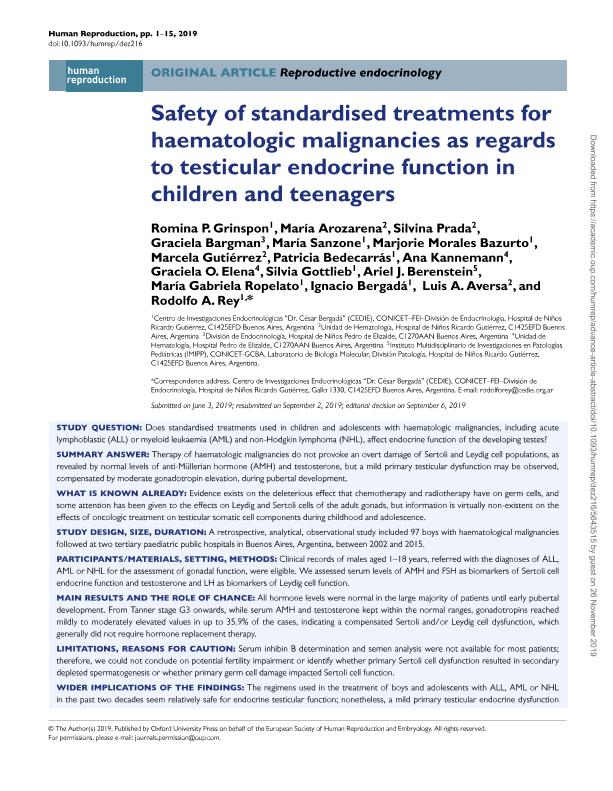Artículo
Safety of standardised treatments for haematologic malignancies as regards to testicular endocrine function in children and teenagers
Grinspon, Romina ; Arozarena, María; Prada, Silvina; Bargman, Graciela; Sanzone, María; Morales Bazurto, Marjorie; Gutiérrez, Marcela; Bedecarras, Patricia Gladys
; Arozarena, María; Prada, Silvina; Bargman, Graciela; Sanzone, María; Morales Bazurto, Marjorie; Gutiérrez, Marcela; Bedecarras, Patricia Gladys ; Kannemann, Ana; Elena, Graciela O.; Gottlieb, Silvia Elisa
; Kannemann, Ana; Elena, Graciela O.; Gottlieb, Silvia Elisa ; Berenstein, Ariel José
; Berenstein, Ariel José ; Ropelato, Maria Gabriela
; Ropelato, Maria Gabriela ; Bergadá, Ignacio
; Bergadá, Ignacio ; Aversa, Luis A.; Rey, Rodolfo Alberto
; Aversa, Luis A.; Rey, Rodolfo Alberto
 ; Arozarena, María; Prada, Silvina; Bargman, Graciela; Sanzone, María; Morales Bazurto, Marjorie; Gutiérrez, Marcela; Bedecarras, Patricia Gladys
; Arozarena, María; Prada, Silvina; Bargman, Graciela; Sanzone, María; Morales Bazurto, Marjorie; Gutiérrez, Marcela; Bedecarras, Patricia Gladys ; Kannemann, Ana; Elena, Graciela O.; Gottlieb, Silvia Elisa
; Kannemann, Ana; Elena, Graciela O.; Gottlieb, Silvia Elisa ; Berenstein, Ariel José
; Berenstein, Ariel José ; Ropelato, Maria Gabriela
; Ropelato, Maria Gabriela ; Bergadá, Ignacio
; Bergadá, Ignacio ; Aversa, Luis A.; Rey, Rodolfo Alberto
; Aversa, Luis A.; Rey, Rodolfo Alberto
Fecha de publicación:
12/2019
Editorial:
Oxford University Press
Revista:
Human Reproduction
ISSN:
0268-1161
e-ISSN:
1460-2350
Idioma:
Inglés
Tipo de recurso:
Artículo publicado
Clasificación temática:
Resumen
Study question: Does standardised treatments used in children and adolescents with haematologic malignancies, including acute lymphoblastic (ALL) or myeloid leukaemia (AML) and non-Hodgkin lymphoma (NHL), affect endocrine function of the developing testes? Summary answer: Therapy of haematologic malignancies do not provoke an overt damage of Sertoli and Leydig cell populations, as revealed by normal levels of anti-Müllerian hormone (AMH) and testosterone, but a mild primary testicular dysfunction may be observed, compensated by moderate gonadotropin elevation, during pubertal development. What is known already: Evidence exists on the deleterious effect that chemotherapy and radiotherapy have on germ cells, and some attention has been given to the effects on Leydig and Sertoli cells of the adult gonads, but information is virtually non-existent on the effects of oncologic treatment on testicular somatic cell components during childhood and adolescence. Study design, size, duration: A retrospective, analytical, observational study included 97 boys with haematological malignancies followed at two tertiary paediatric public hospitals in Buenos Aires, Argentina, between 2002 and 2015. Participants/materials, setting, methods: Clinical records of males aged 1-18 years, referred with the diagnoses of ALL, AML or NHL for the assessment of gonadal function, were eligible. We assessed serum levels of AMH and FSH as biomarkers of Sertoli cell endocrine function and testosterone and LH as biomarkers of Leydig cell function. Main results and the role of chance: All hormone levels were normal in the large majority of patients until early pubertal development. From Tanner stage G3 onwards, while serum AMH and testosterone kept within the normal ranges, gonadotropins reached mildly to moderately elevated values in up to 35.9% of the cases, indicating a compensated Sertoli and/or Leydig cell dysfunction, which generally did not require hormone replacement therapy. Limitations, reasons for caution: Serum inhibin B determination and semen analysis were not available for most patients; therefore, we could not conclude on potential fertility impairment or identify whether primary Sertoli cell dysfunction resulted in secondary depleted spermatogenesis or whether primary germ cell damage impacted Sertoli cell function. Wider implications of the findings: The regimens used in the treatment of boys and adolescents with ALL, AML or NHL in the past two decades seem relatively safe for endocrine testicular function; nonetheless, a mild primary testicular endocrine dysfunction may be observed, usually compensated by slightly elevated gonadotropin secretion by the pituitary in adolescents, and not requiring hormone replacement therapy. No clinically relevant risk factor, such as severity of the disease or treatment protocol, could be identified in association with the compensated endocrine dysfunction. Study funding/competing interest(s): This work was partially funded by grants PIP 11220130100687 of Consejo Nacional de Investigaciones Científicas y Técnicas (CONICET) and PICT 2016-0993 of Fondo para la Investigación Científica y Tecnológica (FONCYT), Argentina. R.A.R., R.P.G. and P.B. have received honoraria from CONICET (Argentina) for technology services using the AMH ELISA. L.A.A. is part-time employee of CSL Behring Argentina. The other authors have no conflicts of interest to disclose.
Archivos asociados
Licencia
Identificadores
Colecciones
Articulos(CEDIE)
Articulos de CENTRO DE INVESTIGACIONES ENDOCRINOLOGICAS "DR. CESAR BERGADA"
Articulos de CENTRO DE INVESTIGACIONES ENDOCRINOLOGICAS "DR. CESAR BERGADA"
Articulos(IMIPP)
Articulos de INSTITUTO MULTIDISCIPLINARIO DE INVESTIGACIONES EN PATOLOGIAS PEDIATRICAS
Articulos de INSTITUTO MULTIDISCIPLINARIO DE INVESTIGACIONES EN PATOLOGIAS PEDIATRICAS
Citación
Grinspon, Romina; Arozarena, María; Prada, Silvina; Bargman, Graciela; Sanzone, María; et al.; Safety of standardised treatments for haematologic malignancies as regards to testicular endocrine function in children and teenagers; Oxford University Press; Human Reproduction; 34; 12; 12-2019; 2480-2494
Compartir
Altmétricas



